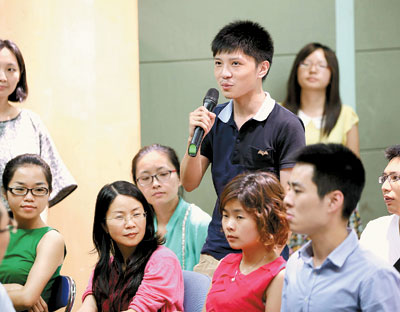|

NOVEMBER is the time of a year the city gives special attention to promoting reading events and books. Yet just when more residents have begun to enjoy the fun of reading, some private reading clubs have found it hard to maintain their operations due to a lack of support in the city.
Wang Yang, secretary general of the Shenzhen Reading Club, recently conducted a research among the city’s 37 major private reading organizations, and found that nearly all of these clubs faced problems such as being short on financing and resources. Some even face the possibility of closing down.
“Private reading organizations need support from the government and professionals to survive,” said Xiong Zongjun, council member and secretary general of the Backyard Reading Club, one of the city’s most popular and renowned reading organizations. “Our biggest problem is that we lack channels to make announcements. We have invited some well-known experts to share their reading experiences, but a lot of people who wanted to come only learned about the activity afterwards. It was a waste of resources. Meanwhile, we can not invite some leading experts or scholars to attend our activities because we don’t have enough money. Lack of funds also makes it hard to ensure high-quality activities for us.”
The financial issue is now one of the biggest concerns for most of the organizations. “All of our activities are free for residents, so all the funds should be raised by ourselves,” said Jing Shuozhuo, a major volunteer at the Shenzhen Reading Club.
The Shenzhen Reading Club currently has five council members, and all of them have to donate money to the club every year to maintain operating costs. Because of the lack of funds, they can only hire two staff members to operate the club.
“Two people on staff are not enough for such a large organization. They have to be in charge in all the affairs, such as planning activities, inviting guests, finding venues, writing proposals and reports, and designing posters,” Jing said. “Because of increasing demands, we need a lot of volunteers. Although there are some volunteers who are always ready to help, so I think that more people can join us to help the club grow.”
“Because of the financial problem, we find it very difficult to find a proper venue for activities,” said Zhang Hong, one of the founders of the 3yecao Reading Family. “I wanted to find a place to tell stories to the children in my community about five years ago, but the property management department refused to provide any space. In the end, an 80-year-old woman in the community helped me solve the problem.”
The reading family has held more than 300 story meetings, lectures and salons last year, attracting more than 10,000 families across the city. However, this large reading club still cannot find a proper office.
“In the beginning, we rented a small office at 3,000 yuan a month. But we did not have financial funds and a business model, so the office closed down after six months. Later a friend voluntarily gave us a small room in his office, but his office moved to Beijing and we lost the room again,” said Li Di, another founder of the 3yecao Reading Family.
Presently, the family shares an office with another company at 1,500 yuan a month, but could only hire one staff member for operations.
“The government only gives us financial support on projects, not on daily operation and maintenance. For example, we received 200,000-yuan support from the government once for a reading forum, so we did not lose money. But nobody wanted to help us cover office and staff expenses,” Li said.
Li went to a tour with his reading friends in Taiwan earlier and built contacts with several major private reading organizations there.
“We found that most of these private reading organizations had financial support from some big financial groups or companies, so they can organize more activities of all kinds and increase their influence in society. I think that Shenzhen can borrow this model to help private public reading organizations,” Li said.
“Also in Taiwan, a lot of entrepreneurs and well-known people join in these reading organizations, using their influence to help promote reading,” Li said.
Jing also suggested that more private reading organizations be opened in the city. “Most of the reading organizations are now in areas such as Luohu, Futian and Nanshan. It is very difficult to find one in Longgang, Bao’an, Pingshan and Guangming. We plan to launch more activities in these areas next year so that people living in those areas can also enjoy the fun of reading.” (Wang Yuanyuan)
|

